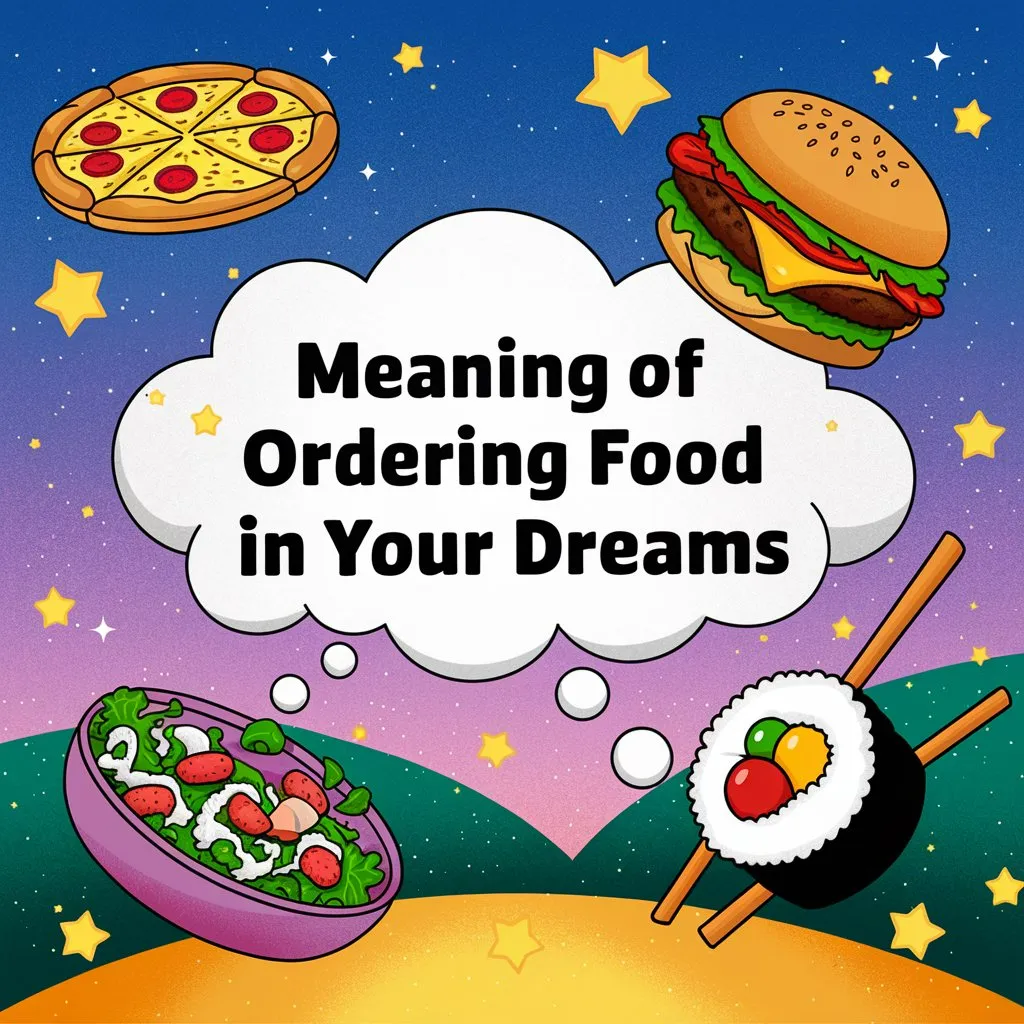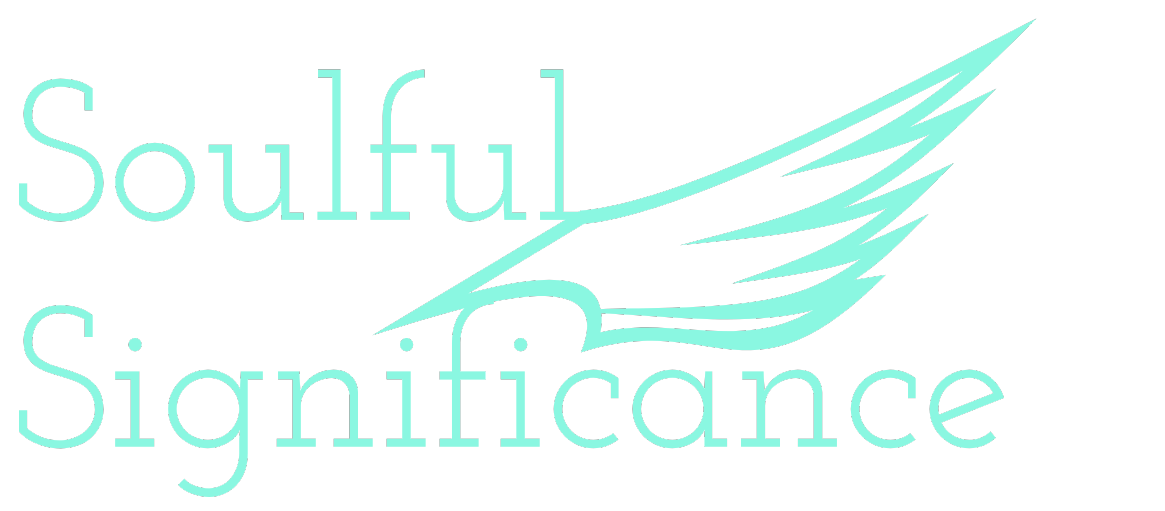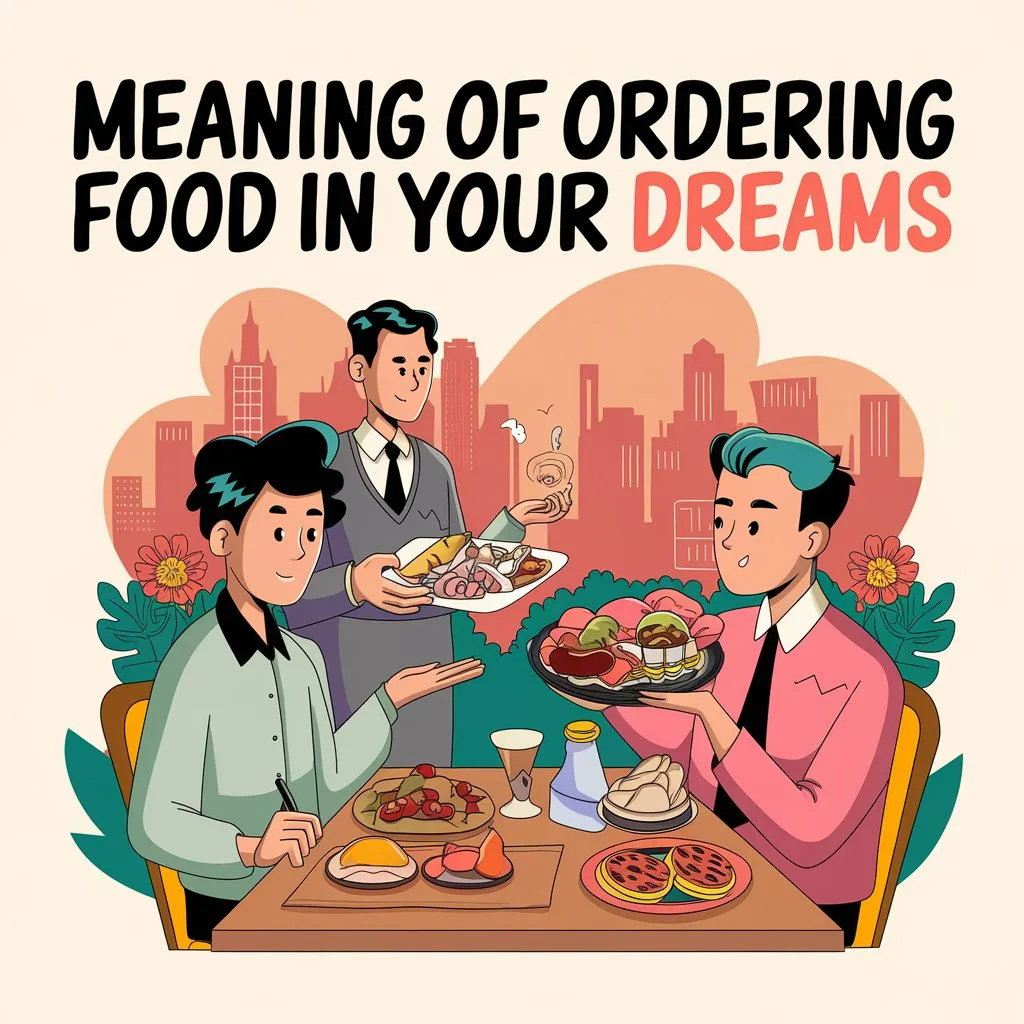The Hidden Meaning of Ordering Food in Your Dreams: A Dream Analysis Guide
You’ve had the dream before – you’re at a restaurant, scrolling through a menu, and your stomach’s growling with anticipation. But what’s behind this recurring scenario? Are you simply craving a midnight burger or is your subconscious trying to tell you something?
Research suggests that dreams about ordering food can be a reflection of your waking eating habits, revealing patterns and habits that might be holding you back from a healthier lifestyle.
But that’s just the tip of the iceberg – there’s more to unearth about the symbolism behind your food fantasies.
At a Glance

- Dreaming of ordering food may indicate a desire for more mindful eating experiences or a longing for comfort, simplicity, or nostalgia in waking life.
- Paying attention to the foods you crave in your dreams can reveal patterns and habits that can inform healthier choices and improve overall well-being.
- Consistently dreaming about food might be a sign that you’re not getting enough nutrients or that your diet is lacking in essential vitamins and minerals.
- Food dreams can also symbolize a desire for relaxation and tranquility, with food serving as a portal to stress relief.
- Analyzing food memories that surface in dreams can help identify underlying emotions and desires, allowing you to tap into your subconscious mind.

Cravings of the Subconscious Mind
As you scroll through social media, your subconscious mind starts to whisper sweet nothings, conjuring up visions of crispy fries and juicy burgers.
It’s as if your brain is hardwired to crave comfort food, especially during late-night scrolling sessions. But have you ever wondered why this happens?
Research suggests that sleep patterns play a significant role in midnight munchies. When you’re sleep-deprived, your body’s hunger hormones go into overdrive, making you more susceptible to cravings.
Additionally, the blue light emitted from your phone or computer screen can suppress melatonin production, further disrupting your sleep-wake cycle.
As a result, your subconscious mind takes control, convincing you that a midnight snack is exactly what you need.
But before you give in to those cravings, take a step back and assess your sleep patterns.
Are you getting enough restful sleep? Are there any underlying issues that need to be addressed?
Food for Thought, Literally
How closely do you pay attention to the language used in food advertisements, from catchy slogans to mouth-watering descriptions?
The way food is presented to us can evoke powerful emotions and cravings, often tapping into our deepest desires and memories.
This is especially true when it comes to food memories, those nostalgic recollections of family gatherings, holidays, or special occasions.
- Food marketers often use sensory language to transport us back to a specific time and place, making our mouths water and our stomachs growl.
- Midnight feasts, for example, are often romanticized as secretive and indulgent, speaking to our desire for freedom and spontaneity.
- The use of words like “homemade” or “artisanal” can evoke feelings of comfort and authenticity, making us more likely to choose one product over another.
- By leveraging our emotional connections to food, advertisers can create a sense of belonging and community, making us feel like we’re part of a larger story.
Brain Chemistry and Hunger
Triggering the release of dopamine, a neurotransmitter associated with pleasure and reward, your brain responds to the sight and smell of food by sending signals that stimulate hunger.
This complex process involves multiple neurotransmitters and hormones that work together to regulate your appetite. When you see or smell food, your brain releases ghrelin, a hunger hormone that stimulates your appetite.
At the same time, your brain also releases leptin, a hormone that suppresses appetite when you’re full. The balance between these neurotransmitters and hormones determines how hungry or full you feel.
As you continue to think about food, your brain releases more dopamine, which reinforces the desire to eat.
This can lead to a cycle of craving and consumption, making it difficult to resist the temptation of your favorite foods.
Understanding how your brain chemistry influences your hunger can help you make more informed choices about what and when you eat.
Emotional Connection to Food
Your relationship with food goes beyond physical hunger, and emotional connections can profoundly impact your eating habits.
Food can evoke strong emotions, transporting you back to a specific moment in time. This emotional connection can be a powerful driver of your food choices, often overriding rational decision-making.
Some common emotional triggers that may influence your food choices include:
- Food memories: Certain dishes can bring back fond memories of special occasions, family traditions, or cultural celebrations, making you more likely to crave them.
- Emotional comfort: You may turn to comfort foods during times of stress, anxiety, or sadness, as they provide a sense of solace and comfort.
- Social connections: Sharing meals with others can foster a sense of belonging and togetherness, making you more likely to order food that’s associated with social gatherings.
- Nostalgia: Foods from your childhood or cultural heritage can evoke feelings of nostalgia, making you more prone to ordering them.
Recognizing these emotional triggers can help you better understand your relationship with food and make more intentional choices.
Stress Relief Through Dreams
Through the lens of your subconscious, food can take on a new role in stress relief, becoming a portal to relaxation and tranquility.
When you’re dreaming of ordering food, your mind is processing emotions and desires, seeking comfort and solace.
This can be an indication that you’re craving more mindful eating experiences in your waking life.
By paying attention to the foods you crave in your dreams, you may discover patterns and habits that can inform healthier choices.
Dreams about food can also reveal insights into your sleep patterns and overall well-being.
If you’re consistently dreaming about food, it might be a sign that you’re not getting enough nutrients or that your diet is lacking in essential vitamins and minerals.
By examining your dreams and connecting them to your waking life, you can make positive changes to your eating habits and improve your overall health.
Nostalgia and Comfort Food
Food dreams often serve as a window into your emotional state, and nostalgia plays a significant role in shaping your cravings.
When you’re feeling stressed, anxious, or overwhelmed, your mind might wander back to the comfort foods of your childhood. These sentimental meals evoke a sense of security and warmth, transporting you back to a simpler time.
Some common nostalgic cravings include:
- Childhood treats like mac and cheese, chicken nuggets, or grilled cheese sandwiches
- Family recipes passed down through generations, like grandma’s famous lasagna or mom’s secret chocolate cake
- Regional specialties that remind you of home, such as New England clam chowder or Texas barbecue
- Holiday dishes that evoke memories of special occasions, like turkey on Thanksgiving or latkes on Hanukkah
These cravings aren’t just about the food itself, but about the emotions and memories attached to it.
Culinary Fantasies and Desires
Many of us have culinary fantasies that tantalize our taste buds and spark our imagination.
You might crave a juicy burger with melted cheese and crispy bacon, or imagine a steaming plate of spicy noodles that transport you to a bustling street in Asia.
These fantasies often stem from food memories, which evoke emotions and sensations that are hard to shake.
Maybe you remember your grandmother’s signature dish, lovingly prepared for family gatherings, or the secret indulgences you savored late at night when no one was watching.
Your culinary desires can be intensely personal, revealing hidden aspects of your personality or upbringing.
Do you yearn for the comfort of familiar flavors or the thrill of exploring exotic cuisines?
Perhaps you’re drawn to vibrant colors, enticing aromas, or the satisfaction of devouring a perfectly crafted meal.
Whatever your fantasy, it’s likely rooted in a deep-seated longing for connection, nostalgia, or pleasure.
Orders From the Unconscious
What drives you to order a particular dish when scrolling through a menu or browsing a food delivery app?
It’s not just about satisfying your hunger or craving something delicious. There’s more to it than meets the eye.
Your unconscious mind plays a significant role in shaping your food choices, often influenced by past experiences, emotions, and memories.
- Your favorite childhood dish might evoke feelings of comfort and nostalgia, making you more likely to order it when stressed or feeling down.
- Unconscious patterns, such as associating certain foods with specific events or people, can also impact your ordering decisions.
- Food memories, both positive and negative, can be powerful triggers, making you more or less likely to choose a particular dish.
- Even cultural and social norms can influence your unconscious food preferences, making you more likely to order something that fits your social identity.
The Psychology of Food Choice
How do subtle cues in a menu or food delivery app influence your decision-making process, leading you to choose one dish over another?
The psychology of food choice is a complex phenomenon, driven by a mix of conscious and unconscious factors.
Food associations, shaped by personal experiences and cultural influences, play a substantial role in your food choices. For instance, the smell of freshly baked cookies might evoke memories of your grandmother’s house, making you more likely to order a dessert.
Cultural influences, such as the prevalence of spicy dishes in certain cuisines, can also sway your decisions.
Moreover, the way menu items are presented can profoundly impact your choices.
Menu engineers strategically use language, imagery, and placement to nudge you towards certain options. For example, dishes with descriptive labels, such as “succulent grilled chicken,” are more appealing than those with generic names.
Additionally, the use of high-quality food images can stimulate your appetite and influence your order.
Symbolism Behind Food Symbols
Several decades of research have demonstrated that the symbols and icons accompanying food items on menus and in food delivery apps hold a hidden power over your ordering decisions.
These symbols aren’t just random visuals; they convey meaning and influence your choices.
- The color red is often associated with spicy or bold flavors, triggering your brain to prepare for a thrilling experience.
- Images of fresh vegetables and greens evoke feelings of health and wellness, making you more likely to opt for a salad.
- Icons of national flags or cultural emblems can evoke a sense of nostalgia and familiarity, drawing you to dishes from your heritage.
- Pictures of happy, smiling people enjoying a meal can create a sense of social belonging, making you more likely to choose a particular dish.
The language of food symbols is complex, and understanding its cultural significance can help you become more aware of your ordering habits.
Unraveling the Food Dream Code
You’ve likely experienced it before: a vivid dream where you’re indulging in a mouthwatering feast or craving a specific dish.
But have you ever stopped to think about what these food dreams might mean? Unraveling the food dream code requires digging deeper into your subconscious mind.
One effective way to do this is through dream journaling. By writing down your dreams as soon as you wake up, you can tap into your subconscious thoughts and emotions.
Reflect on the food memories that surface in your dreams. Are they associated with happy times, comfort, or nostalgia? Or do they evoke feelings of anxiety or stress?
Analyzing these food memories can help you identify patterns and themes in your dreams. For instance, if you frequently dream about a childhood favorite, it may symbolize a longing for simplicity or comfort.
FAQs
Can I Control What I Dream About Ordering Food?
You can influence your dreams, including what you order, through dream incubation techniques, such as visualization and affirmations. By focusing on your food preferences, you’re more likely to manifest them in your dreams, but it’s not a guaranteed control.
Do Food Dreams Affect My Waking Food Choices?
You wonder if your dreams influence your daily food choices. Research suggests that food nostalgia and emotional triggers in your dreams can subtly sway your waking preferences, making you crave comfort foods or nostalgic eats.
Are Food Dreams More Common in Certain Cultures?
You find that certain cultures place high cultural significance on food, leading to more frequent food dreams, especially in societies with strict food taboos, where the subconscious rebels against restrictions, making food dreams a common phenomenon.
Can Food Dreams Reveal Underlying Health Issues?
You may wonder if your dreams can reveal underlying health issues, and the answer is yes; they can indicate nutrient deficiencies or emotional cravings, serving as a window into your body’s needs, encouraging you to make conscious changes.
Do Food Dreams Have a Universal Symbolic Meaning?
You explore the idea that food dreams have a universal symbolic meaning, and research suggests that culinary symbolism can represent emotional fulfillment, but individual experiences and cultural backgrounds also influence dream interpretations.

I’m Eliza Trinity, a spiritual guide and writer at SoulfulSignificance.com, where my mission is to illuminate the path of spiritual fulfillment through Christ’s teachings. With a Theology degree and a counseling background, I blend biblical wisdom with real-world insight to support those on their journey to discovering their soul’s significance.



